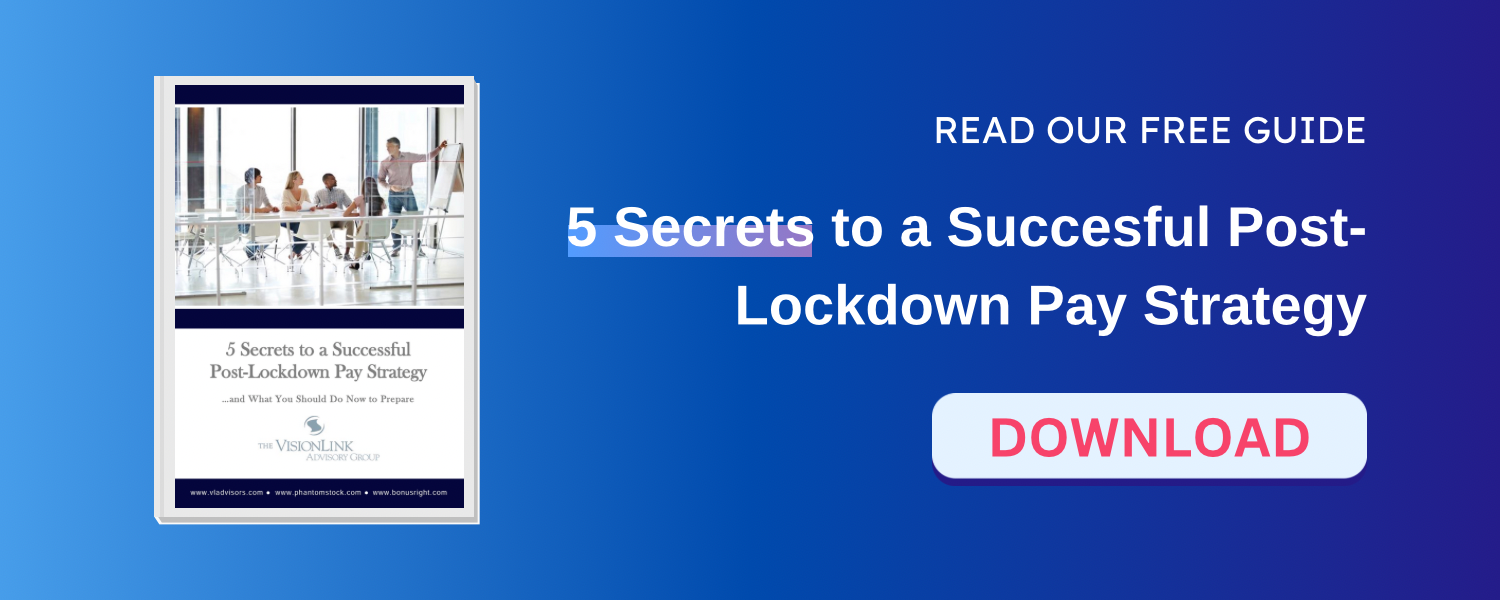
To state the obvious, uncertainty is the only certainty for the foreseeable future. It’s an unusual time and I know we’re all hoping for the best. Unfortunately, the business forecast (not to mention “real-life”) suggests we’re headed for significant economic turbulence. So, this may be a good time to talk about how to approach your compensation strategy should a recession result from current conditions. In reality, these principles apply to any economic cycle, but they become particularly important in a significant slowdown.
First of all, if you’ve been in business a while, you’ve lived through a range of economic cycles and experienced the crises that sparked the bad ones. So you know that to flourish during difficult economic periods, it’s important to avoid being too short-term in your thinking because things eventually rebound. And, in the case of our current situation, that could happen fairly quickly. So, the overriding principle you want to follow is to remain strategic in your thinking and planning. Yes, you need to address today’s reality, but you should do so with your eye on tomorrow’s opportunities. If you don’t maintain that kind of “dual vision,” your company’s rebound could be much slower than it needs to be.
With that general guidance in mind, you’ll want to apply these seven keys:
1. Assess Your Talent Pool
Evaluating which of your employees represent key, superior talent and which are average (or worse) is critical at any time, but especially during economic downturns. This probably seems obvious. However, too many business leaders haven’t taken the time to make this distinction. You will be able to navigate difficult cycles if you constantly evaluate your talent and identify who is consistently adding value. If you combine that assessment with a compensation approach that rewards those people for the wealth multiple they help create, they are more likely to stick with you in hard times and act like growth partners. So, take time to identify who your best people are and make sure they know what their role is in the future of your company, especially during periods like the one we’re in.
2. Define Value Creation and Articulate Your Pay Philosophy
Every organization needs to be clear about how it measures value creation. This means identifying the threshold at which profits are attributable to the contributions of your people and not just existing assets and good will. This definition sometimes changes when a difficult economic cycle hits but employees must be clear about what it is and how they impact it in their roles.
Once you have defined value creation, you must then identify your philosophy about both how and how much of that increase will be shared, and with whom. If we’re in the midst of an economic downturn, you must determine the right balance between guaranteed and incentive compensation (value-sharing) and between short and long-term variable pay—and then communicate that philosophy to your people. When you take time to think this through, you can create some flexibility for yourself in your compensation approach that addresses times when cash flow or profitability is lower or unpredictable. For example, you may determine that during such times you’ll increase the percentage of compensation applied to long-term plans (many of which have no immediate cash-flow impact on the company) and decrease contributions to programs like your annual bonus plan. All of this can be dealt with in your pay philosophy and will help you when you need to communicate with your people about compensation.
3. Reward Outcomes Tied to Your Core Strategy
Presumably your long-term vision for growth isn’t dependent on what the economy is doing. You want to have a statement that defines the core strategy of your business in one or two sentences, with two to three bullet points identifying key initiatives and areas of focus. You should then make sure all your key people understand it (even to the point of being able to recite it).
Now, during recessionary periods, some of your key initiatives may change or be re-prioritized. However, the core strategy of your company should remain the same. So, while you’ll want to make sure your key talent knows the results for which it is responsible “right now” (and that those things are priorities), you must always tie those outcomes to the core, long-term strategy the company is pursuing. Then, make sure your people are rewarded for fulling the outcomes their position exists to fulfill—and that those rewards don’t undermine your long-term strategy. In the end, you want to create line of sight so you ensure your employees understand the relationship between the vision of the company, its business model and strategy, their role in that model and strategy, and how they will be rewarded for fulfilling those expectations.
4. Define Clear Performance Expectations
Your key people need to know how the future company will be different than the present company—especially during hard economic times; and what you want their contribution will be to that growth. They then need to understand what they should focus on right now towards that end. Star performers want a clear understanding of the key results they are responsible for and what their stewardship will impact. When they see that relationship, they find meaning in the company’s growth because they understand their role in it. Good people have the skills to perform, they just need to understand what outcomes are most critical for them to achieve. “What am I responsible for, what impact will it have on the future company, and how will I be rewarded if I meet or exceed those expectations?” This fits hand in glove with #3.
5. Nurture an Ownership Mentality
Most owners hope to have a workforce that thinks like they do and will execute priorities and initiatives accordingly. In recessionary periods, perhaps nothing could be more critical. An ownership mindset permeates an organization when the “line of sight” spoke of earlier exists. As a result, the starting point for building that kind of thinking is to determine where employees currently stand in this regard. Do they understand the shareholders’ vision? Do they believe the company can achieve the business plan it has in place? Do they understand how they can contribute to the achievement of the company’s goals and objectives? Is it important (meaningful) to employees that the company meets its targets because of how they will benefit personally?
6. Build a Value Statement
Great employees want to be able to fulfill three financial ambitions through their participation in the compensation their employer provides: cash flow and standard of living requirements (salary and short-term incentives), security (benefits programs), and wealth accumulation opportunities (retirement plans and long-term value-sharing plans). The best way for key people to visualize how these elements are addressed in your pay approach is to give them a statement that summarizes and projects the total value of their financial partnership with the company. This kind of summary should show what their salary is projected to be, what kind of short-term incentive payouts will occur (based on targeted assumptions), what will accumulate in their 401(k) plan (based on contribution and return assumptions), and what will accrue in their long term incentive plan (if targeted performance is achieved). Such a picture allows an employee to “see the forest for the trees” in difficult economic times and how the company’s rewards philosophy provides the flexibility necessary for superior performance to always be rewarded.
7. Cut Business Expenses First, Incentives Last
"Companies need to avoid making hasty decisions due to current economic situations, and consider the longer-term effects on employee engagement, motivation and performance. Many companies are being more prudent with compensation and bonuses, but if employers don't play their cards right, they may find themselves without a full house when the economy turns around.” Tom McMullen, U.S. rewards practice leader of Philadelphia-based HR consulting firm The Hay Group during the 2008-09 Great Recession
“Four in 10 companies (41 percent) said they are very likely to respond to the economic crisis by cutting travel and entertainment spending. More than one-third (36 percent) are very likely to freeze or reduce hiring, and only 18 percent are very likely to reduce bonuses. Based on a Compensation in Crisis survey by Stamford, Conn.-based HR consulting firm Towers Perrin in 2008-09 that polled HR executives and others at more than 450 companies in the United States.
Your best people need to know that you are committed to their future—and that their future and the company’s are closely linked. Your approach to compensation will either emphasize or refute that message. This doesn’t mean you should pay incentives if profitability or other thresholds haven’t been met. (If you take some of the steps outlined in this paper, you will avoid being in that position.) It does mean, however, that you reward performers and reinforce the results you need to continue to achieve—and that you don’t try to resolve the company’s financial woes at the expense of your best people.
We can’t control what happens to the economy later this year or any time in the future. However, we can control how prepared we will be regardless of what happens. So be smart. This too shall pass. Make sure you’re ready to put your foot on the accelerator when it does.
Ready to Get Started?
When it comes to building a compensation strategy, you can trust that VisionLink knows what works and what doesn’t. We are ready to share that knowledge with you.
Stay Connected
Receive free, ongoing access to updates on compensation and talent trends, reports, events, and more.


